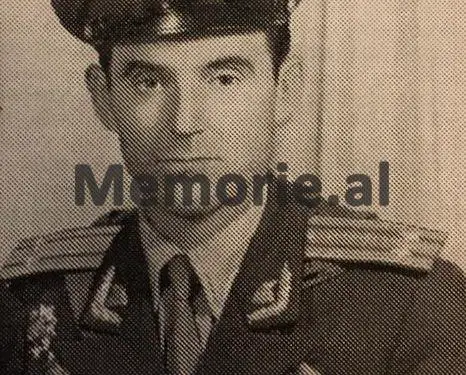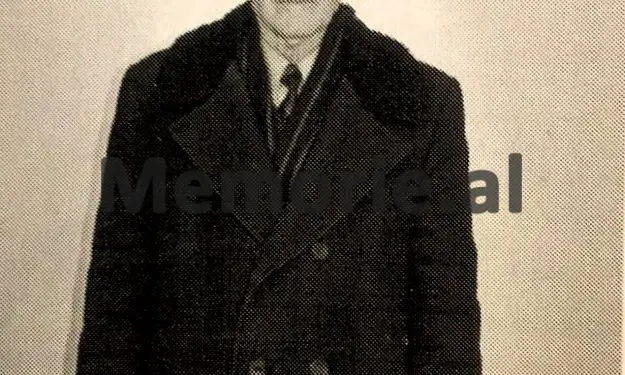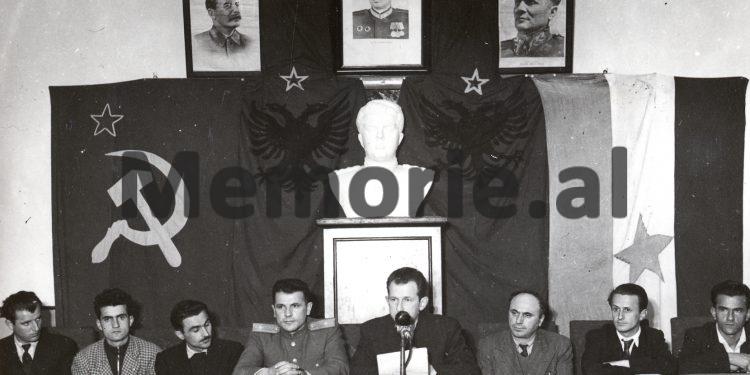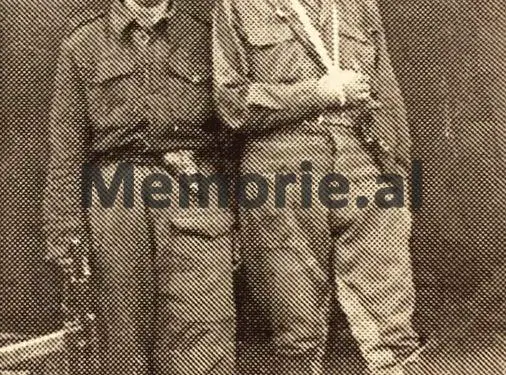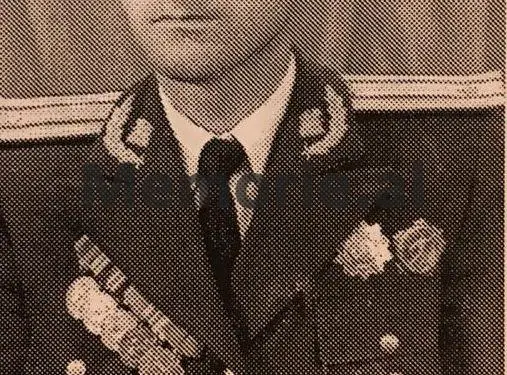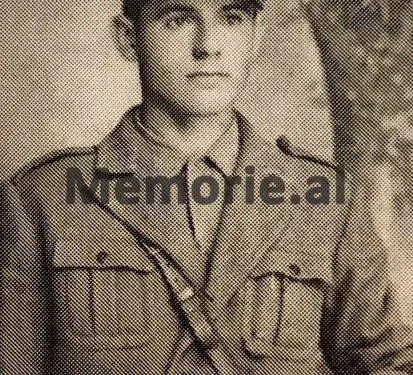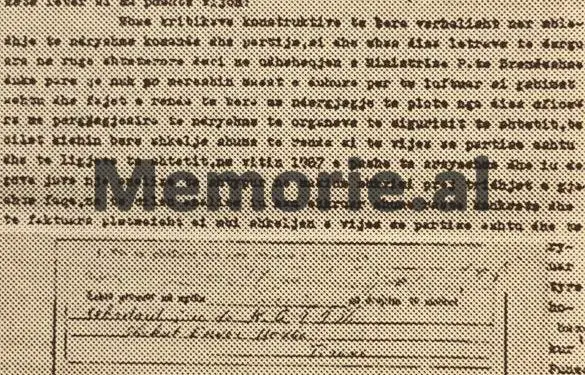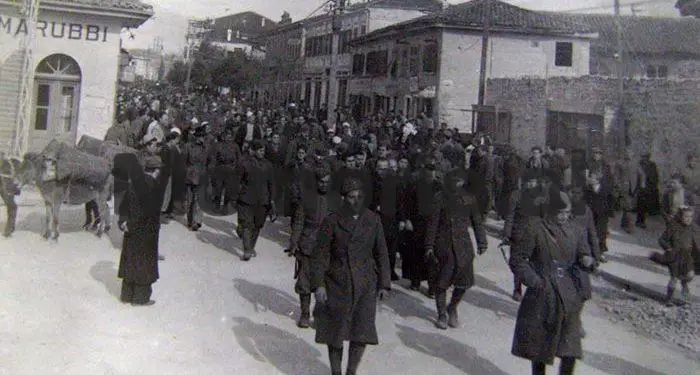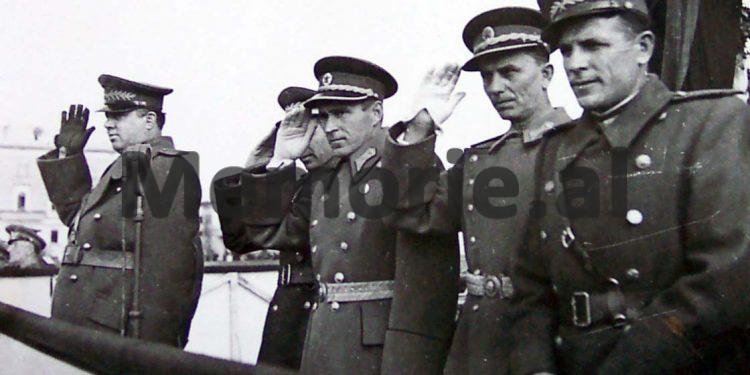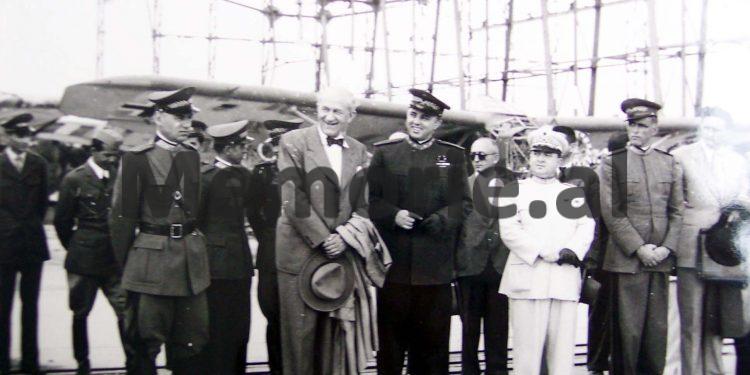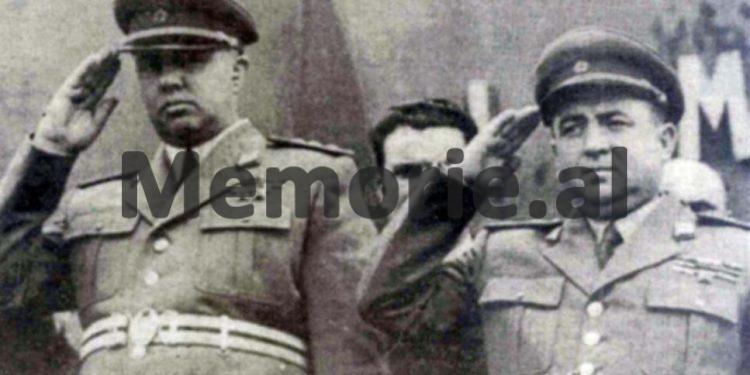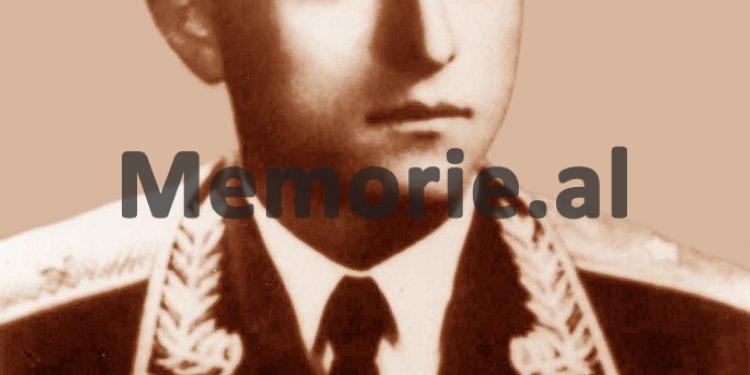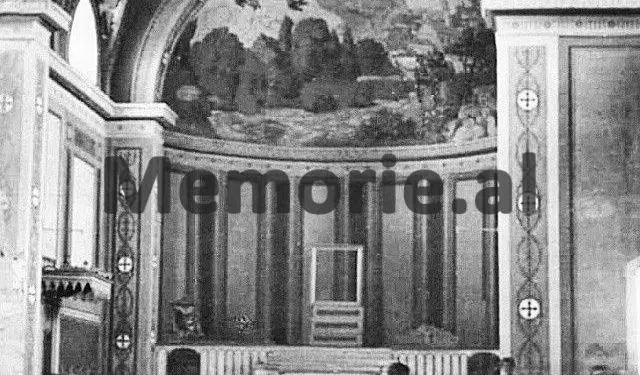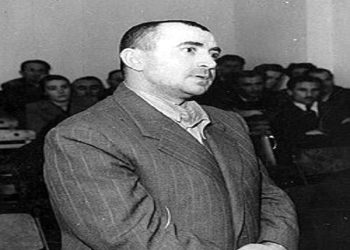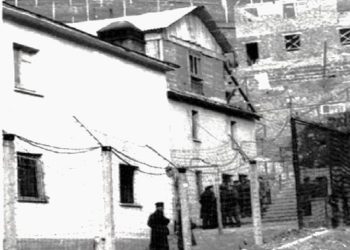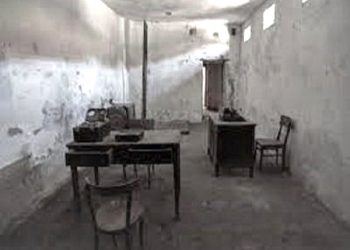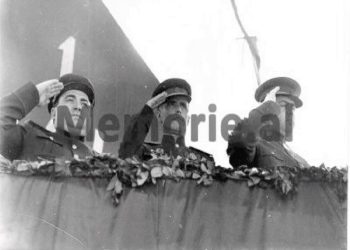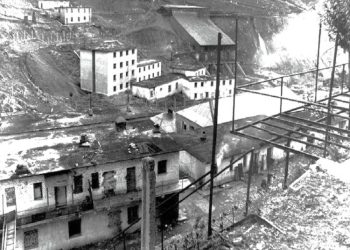Dashnor Kaloçi
Memorie.al publishes the unknown story of the former senior military soldier of the State Security, Lieutenant Colonel Pandeli Përmeti, originally from the village of Bual Përmetit and born in the city of Korça, who recounts his entire career in the bodies of the Ministry of Labor Internal since the end of the war when he came from the partisan ranks, being an effect of the 4th Assault Brigade and had been wounded twice, the appointment to the post of Chairman of the Internal Affairs Branch of Mallkastra wherein 1948 he made a visit to Mehmet Shehu, who was locked up in his home in the village of Çorush, where he was awaiting arrest by Koci Xoxe, for one year at the Shkodra Regional Directorate of Internal Affairs, where he spent a long time verifying the Catholic Clergy’s files. after an order that Enver Hoxha had given to Kadri Hazbi for their strike, the mystery of the death of Major General Hilmi Seiti that I had k close, the bombing of the Soviet embassy in Tirana where he that investigator of that case was able to release only one of the arrested, staging the event in the village Gjorëm of Vlora for an assassination attempt on Hysni Kapos who sent to shoot an officer State Security, up to the 36-page long letter he sent to Enver Hoxha in 1967, denouncing many of the State Security’s behind-the-scenes, after which he was called by Manush Myftiu to give up. and the negative response that caused him to be demobilized from the ranks of the Ministry of Interior, to be sent as a worker with three shifts and night guards to the “Enver” Factory, and to arrest and sentence his son, who was an aviator, to political imprisonment. .
follows from the passed number
The plan of the “Free Albania” Committee for the overthrow of Enver Hoxha
“Also at that time, tracts were thrown by planes in which the people were called to stand up for the overthrow of the communist government of Enver Hoxha. After all these preparations, the Committee “Free Albania” managed to draft a concrete plan for the beginning of the armed uprising, which defined all the details, all movements, people, means, bases, military units, and funding. necessary that would be made available to that uprising. When everything was prepared and only the date of the beginning of the uprising was expected to be set, in the main leadership of the “Free Albania” Committee, the contradictions began which had to do with who would come to power in Albania after the fall of Enver’s Government. Hoxha and who would be the possible allies outside Albania, where they would be supported. As a result of these contradictions, this pre-prepared scenario failed, and for its discovery, the State Security received great help from the Soviet KGB. In that very turbulent situation and feeling completely insecure, on March 21, 1949, Enver Hoxha at the head of a delegation went to Moscow and met Stalin, to whom he asked for help to get through the difficult situation in which he was, promising to eliminate all anti-Sovietists as he had done with Koci Xoxa who had been arrested and was undergoing an investigative process “, recalled Pandeli Përmeti, the period when the Anglo-Americans and the Free Albania Committee “, They drafted the plan to start the uprising that would overthrow the communist government and Enver Hoxha went to Stalin to ask for help.
Enver in the Plenum: Arrests begin
But what is the truth about the incident at the Soviet Embassy in Tirana and what were the reasons for that incident? To this, Pandeliu testified: “After Enver received full support from Stalin, promising him that he had broken with the Yugoslavs once and for all and would follow a strict pro-Soviet line, he returned to Tirana and immediately began the campaign for hit all those people who had supported Koci Xoxen in his pro-Yugoslav line. Enver did this to build confidence in Stalin, that he was following the line and pro-Russian policy he had promised him. Pursuant to the instructions that Enver had received from Stalin and to stabilize the situation and the critical situation in which Albania was at that time, from the beginning of February 1951, a few days before the beginning of the works, the IX Plenum of the Central Committee of To the ALP, Enver Hoxha ordered the Minister of Interior, Mehmet Shehu, that the Security Forces prepare the lists to start the arrests of many suspicious intellectuals who had graduated from schools in the West because they were the first contingent to support the agencies. foreign to overthrow the regime in Albania. These lists had to be ready, and if there were turbulent situations where the stability of the country was seriously endangered, they would be immediately eliminated by being shot. By order of Enver Hoxha, these lists were made almost on February 20, 1951 (one day after the beginning of the works IX Plenum of the ALP), and were handed over to Enver Hoxha, who would decide who were the persons who would be executed. On the second day of the Plenum, Enver Hoxha raised the issue of cracking down on all suspicious elements who should be arrested because, according to him, they posed a serious risk to the country’s fate, being the first contingent to support the foreign reaction which aimed at overthrowing the popular power in Albania. At the time that Enver Hoxha raised that issue, there were many reactions from the members of the Plenum and among the main ones who rose up against that proposal were Tuk Jakova, the Minister of Justice, Manol Konomi and Teodor Heba, who were the Chief of Staff in the Committee. Central. During the debates on the issue, Manol Konomi tried to argue that there were no legal grounds to support the arrests, which were supported by Tuk Jakova and Teodor Heba. From the numerous debates that were created, Enver Hoxha proposed that there be a break and that the work of the Plenum starts tomorrow “, Pandeliu recalled regarding the proposal of Enver Hoxha in the IXth Plenum, to prepare lists for the arrests of suspicious elements.
Plenum: Agree on arrests
But how did the events unfold the day after the Plenum meeting, and was it decided that the arrests should begin? Regarding this, Pandeli Përmeti testified: “After Enver Hoxha encountered opposition from some of the members of the Plenum regarding his proposal to start arrests against suspicious elements, he interrupted the Plenum and that night on February 23, 1951, which was the holiday. of the 31st anniversary of the creation of the Red Army, the bombing of the Soviet Embassy, which was previously plotted by the State Security itself, took place. After this event, Enver Hoxha reopened the Plenum and after taking the floor, informed all those present who were there, saying, among other things: ‘Here is what the enemy elements are doing to us’! After that, all members of the Plenum, together with those who had opposed the arrests, unanimously agreed to launch an investigation into the incident and to punish the perpetrators of that act. Members of the Plenum held this position because they had no idea that the bomb at the Soviet Embassy had been dropped by the State Security itself on the orders of Enver Hoxha, who had taken that decision to give Stalin proof of loyalty that he was pursuing. his path ”, Pandeliu recalled the machinations used by Enver Hoxha in the IXth Plenum to convince the members of the Central Committee to make the decision for the arrests of the suspicious elements.
Investigator of the bombing incident at the Soviet embassy
But how did the scenario of dropping the bomb on the Soviet embassy come about? Regarding this, Pandeliu testified: “According to Enver Hoxha’s order, the lists of people to be arrested were prepared in advance by the Security people where I worked. In those days when those lists were being compiled, a colleague of mine who was in charge of that job called me and asked me about a boy with the surname Zheji, who at the time was studying at the two-year Pedagogical Institute in Tirana, and his father had been an officer. high in the time of Zog. I knew him as a good man, and I told my colleague to delete him from the list of those to be arrested, and he did. On the night of February 23, when the bomb was dropped, senior State Security chiefs told Colonel Sali Ormeni, who was then Police Director and Deputy Interior Minister, to remove one at a certain time. by the police guarding the embassy, in order to approach the Security man, who would drop the bomb. Sali Ormëni refused to do so and vehemently opposed them, even though he was told they were being carried out on Enver Hoxha’s orders. The next day, Sali Ormën was hospitalized in a psychiatric hospital, saying he was insane, and a few days later, through a scenario, he was physically eliminated in the forests of Elbasan. The night of the bombing, according to earlier lists, 24 people were arrested and brought to the Interior Ministry, locked up in 24 separate rooms with 24 investigators, one of whom was me. In the group of 24 detainees, I was assigned a young boy from Kosovo, who was called Halit (I don’t remember his last name). Throughout the night I conducted the investigation with him, (going to the scene himself), I came to the conclusion that he had no hand in the matter. During a break, Mehmet Shehu called me and asked me how the investigation was going with the detainee I was investigating. I told Mehmet that he had no hand in the matter and I was completely convinced of that. After that, he told me that if it was as I told him, I would release him, after sending him to the Tirana Directorate of Internal Affairs. And as Mehmeti told me, I sent Haliti to the Tirana Directorate and then released him from there. He was the only person released from the 24 detainees because the other 23 detainees were all taken into custody at night and shot at a secret location, dumped in a large pit that had been dug that same night in secret. great. One of the 24 detainees, named Jonuz Kaceli, died that night during an investigation at the Interior Ministry. I had known Jonuz before, and when his investigator opened the door and went out into the hallway to rest, Jonuzi saw me and shouted that he was innocent, so that I could hear him. But I was completely powerless to help him because we were not allowed to interfere with each other during the investigation. The next night, when the investigation of the 24 detainees began, a loud noise was heard and we all went out into the yard, where we saw Jonuz Kacel lying on the ground covered in blood. We were told that he jumped out of the window himself during the investigation, but the truth was quite different because in the position he was lying in, he never had a chance to fall. Likewise, the window from which we were told that he jumped, was very narrow and could not push him, because Jonuzi was healthy. From that time on, I thought that he had been strangled in the room and then taken out, provoking the noise that he was allegedly thrown out of the window “, concluded his story Pandeli Përmeti, former senior security officer with the rank of the lieutenant colonel, who added that in order to legally support the execution of the 23 arrested, in those days on February 26, 1951, the Presidium of the People’s Assembly of Albania issued a decree with six articles, entitled: “On prosecution and prosecution of the activity of terrorist organizations and terrorist acts, against the employees of the People’s Power and the political and social organizations of the People’s Republic of Albania ”, wherein its six articles, it was stated that the accusation was submitted to the defendant only one day before the trial, the trial was held without the participation of the parties, recourse against the final decision and the submission of apologies was not allowed, the decision to the extent higher execution, is executed immediately after the decision is given ”. In the 36-page long typed letter that Pandeli Përmeti sent to Enver Hoxha in 1967 when he was the Chief Investigator in the Internal Directorate of Tirana, in which he denounced many of the machinations and stagings of the State Security, by He was arrested, imprisoned, deported and executed by dozens of people he also raised the issue of the incident in Vlora district in 1960, where five people were arrested, accused of wanting to blow up a bridge in the village of Gjorm, where Hysni Kapo would pass.
The assassination of Hysni Kapo
But what is the truth about that event and who were the people who staged it and those who were accused of being terrorists? In this regard, Pandeliu testified: “On May 25, 1960, the Vlora Branch of Internal Affairs (Security) with Major General Sulejman Manoku and Deputy Chairman, Major Gole Bashari, arrested five people, who were said to be that they were members of an organized group with activities against the Party and the People’s Power. Four of these persons: Rexhep Osmani, Hamit Osmani (brothers) Selman Kapaj, and Lamçe Kuqi, were from the village of Gjorëm in the district of Vlora, while the fifth (a name I do not remember) was from the village of Lepenica. Both Gjormi and Lepenica were looked down upon by the Party because they were the villages of Hysni Lepenica and Sadik Premtes and Neki Ymeri, whom Enver Hoxha had declared enemies and since then all the inhabitants of them were treated as such. two villages. Of the arrested persons, three of them: Rexhepi, Hamiti, and Selmani, were party members, while the other two, Lamçe Kuqi and Lepenica, were disorganized. All five were charged with “state terrorism”, (under Article 67 of the Criminal Code) for espionage, (Article 65) for diversion, (Article 70) for sabotage, (Article 72) preparation for fleeing abroad in a group ( article 64/10), charges which according to the Criminal Code of that time, for each special article, were foreseen as a measure of punishment from ten years in prison, to shooting and confiscation of property. This accusation was made against them, as it was said that they had wanted to blow up a bridge in the village of Gjorëm, when Hysni Kapo would pass by on the highway that passes between the village of Gjorëm and Lepenica, to go. in his hometown of Tërbaç, he would be killed by State Security officers who would go there on duty, as well as other charges such as diversion, attempted escape, sabotage, and espionage. After their arrest, a group of investigators was formed, and one of them was me, and the person I was assigned to investigate was Hamit Osmani. As soon as I started the investigation, interrogating the arrested person, he answered me by saying: ‘I was arrested in vain, I did not commit any crime against the party and the government, I was arrested because maybe he slandered someone for ambition or revenge, etc. ‘. At the time he was speaking to me, I was immediately reminded of the words of the person I had interrogated on the occasion of the bombing at the Soviet Embassy in Tirana (which I could save from being shot innocent, with the help of Mehmet Shehu) whose words sounded the same to me as Hamit often said to me: ‘You will see, if we are alive, be you who will set us free and say that we were arrested without guilt. , and if they shoot us, you will again be the one, to tell the truth, that we were shot without guilt, ‘Pandeliu recalled the words of Hamit Osmani’s defendant at the time of his investigation.
Stuffed charge
But how did Pandeli deal with the accused under investigation and what happened next with the whole group accused of terrorism? He recalled: “In those circumstances that happened to me and after the words that Hamit Osmani told me, I began to pay more attention and time to verify the materials that were inside his criminal file, as well as other information that I collected, immediately set in motion the Security officers I had subordinated to in my sector and other illegal sources. After that, I managed to verify and fully discover that some materials were false, some forged, and some others were extracted from the provocations that had been made by the organs of the people of the State Security. A few months later, from the day the investigations began, by order of the First Deputy Minister of Internal Affairs, I was appointed in charge of directing the investigation of the entire group. This gave me the opportunity to look at all the materials collected (legal and illegal) for each detainee because previously the investigation was secret and no investigator could participate in the investigation of the other investigator. As those in charge, I contacted all the detainees and all five told me they were innocent. After verifying all the detainees, as well as the collaborators who had informed illegally, it turned out that the five arrested persons were honest and regular family members, while the Security collaborators who had denounced them were degenerate elements of compromised as spies and immoral theft. After I was assured of this information, I decided to come out openly in defense of the detainees and I did that in the face-to-face meeting with the leadership of the Vlora Branch “, Pandeliu recalled, regarding his decision to protect five the arrested.
In defense of those arrested
But how did the events unfold after the five arrests, and did Pandeli manage to acquit them? For this, he recalled: “Before I made the decision to protect them, I was faced with two alternatives: either to walk the wrong and criminal path required by the leadership of the Vlora Internal Affairs Branch Party and that of the Ministry, where I would compromise myself too heavily, like a dirty and servile dirty tool or to act honestly by acquitting them innocent, as they were, from which I would have consequences, as any of them from torture could accept the accusations made against them and then I would be accused as a defender of the enemies because their arrest was made with the consent of the leadership of the Branch, the First Secretary of Vlora, the leadership of the Ministry and senior leaders of the ALP. Also, the sanctioning (accusation) of their arrest was done by Aranit Çela himself, the General Prosecutor of the Republic. At the branch meeting of the Branch, I argued with facts, refuting all the accusations against them, saying: ‘It is not true that Hamit Osmani had given the dynamite to the person who was said to be placing it on the bridge where he would pass. comrade Hysni Kapo, because with that person, Hamiti had been at enmity for years and that was known to all the villagers. It is not true that the rifle and the three bombs were found in the chimney of Lamche Kuqi’s house, because they were not only not smoked but were also engraved, and they were inserted there by the State Security itself, after Lance’s arrest. , because the house was empty because his people had fled to relatives out of fear. ‘ I also denied all other allegations, such as: finding radio receivers and cameras, attempting to escape, meeting with saboteurs, sabotaging artificial intercourse, not watering crops, releasing livestock, etc. I also stated that I had found the Operating Worker, Agja Lani, in the office myself, writing the report that he presented as if it had been made by his collaborator, and I also denounced the extension of the investigation, which for two months that the law had, continued. for 18 months. (with the approval of Aran Çela). After that, I came across a lot of pressure from the Branch leadership, who asked me to lead that process as they wanted, and from my objections, the situation became very tense. Based on this, I submitted the investigative file and moved completely from the process, but even after that, various provocations and scenarios started to happen to me, which forced me to send a letter to Minister Kadri Hazbiu, asked me to transfer from Vlora, a request which the ministry approved and transferred to me, returning me to Tirana as Chief Investigator in the Internal Directorate “, Pandeliu recalled, the period when he was forced to withdraw from that process, as a result of pressure that was done to him.
Operational Worker Shooting
But how did things turn out after Pandeli left, with the group accused of trying to assassinate Hysni Kapos, blowing up the bridge where he was going to go to the village of Tërbaç? In this regard, he testified: “Investigations continued again and at that time, a brother of the two arrested (Samo Osmani, 35 years old and married), was found hanging from a mule rope in the woods as he went to ground. in the mill. In the Vlora Branch of the Interior, it was said that he had committed suicide, as a determined enemy, in order to cover up the hostile activity of his two arrested brothers, but that was unbelievable and I always suspected that he had been killed. the State Security itself. As early as 1961, as the investigation continued, Security people stole the shop in the village of Gjorëm (taking 12,000,000 lekë in goods) and charged the seller, Çarçan Veraj, with the intention of arresting him as a member of that group. But the villagers, who knew their salesman as an honest, indignant man, set in motion to catch the thieves and discovered the stolen goods as well as the real perpetrators: a gang of thieves put under the service of the State Security, which consisted of 5-6 people, headed by the Operative agent, Agjah Lani. After that, their entire group was arrested and sentenced by the Court to up to 25 years in prison, while Operative agent Agjah Lani was sentenced to death and shot. But his shooting was done to close his ties with the top leadership in Tirana, who ordered him to stage that “hostile group”, Pandeli Përmeti concluded, adding that: although they were shot and The five innocent villagers who were accused of being terrorists against the main chiefs of the Vlora Internal Affairs Branch were released. Not only were no measures taken, but they rose to their duties, being sent as Interior Offices in Peshkopi and Skrapar.
Punishment of Pandeli’s family
What happened next to Pandeli Përmeti, after the letter he made to Enver Hoxha in 1967 when he was Chief Investigator at the Tirana Directorate, where, among other things, he denounced the event in Vlora? For this, he testified: After that long letter I sent to Enver Hoxha, I was released and forcibly sent to work at the “Enver” Factory, NSHRAK, and night watch at an Exhibition, removing my disability. I was wounded in the war. After that, my cousin, a former partisan in the First Brigade, who worked at the Central Post Office, plotted a scenario by putting four cheesecakes in his bag and then fired him, accusing him of being a thief and expelling him from the party… The controversy over my family continued for a long time with the arrest of my uncle, Roland, who was a pilot in Aviation, who was sentenced to four and a half years in political prison for allegedly saying that: the Chinese machines were old and did not work. Former Lieutenant Colonel Pandeli Përmeti ends his confession, adding that after the collapse of the communist regime, when he started denouncing the crimes of the State Security again, making them public in the press, his other 31-year-old son was killed./Memorie.al




